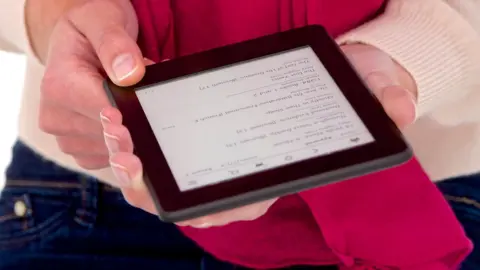Microsoft's eBook store: When this closes, your books disappear too
 Getty Images
Getty ImagesThere’s bad news for users of Microsoft’s eBook store: the company is closing it down, and, with it, any books bought through the service will no longer be readable.
To soften the blow, the company has promised to refund any customers who bought books through the store (a clue that there may not have been that many of them, hence the closure. Microsoft did not offer further comment).
But just think about that for a moment. Isn’t it strange? If you’re a Microsoft customer, you paid for those books. They’re yours.
Except, I’m afraid, they’re not, and they never were - when you hand over money for your “book”, what you’re really paying for is access to the book. That access, per the terms and conditions of every major eBook store, can be taken away at any moment.
This is how we’ve been led to this curious situation, where Microsoft’s eBook customers - however few - will see their book collection vanish, just because company executives have decided it’s no longer worth keeping the store running.
It’s a reminder, one I think which needs repeating regularly, of the shift in how we define ownership in the always-online era. In this case it’s about books, but it’s the same with most of your digital purchases - we’re increasingly leasing our minor belongings, which I think means leasing aspects of our memories and even personalities too.
Protecting the food chain
I doubt we’d accept such a scenario in the offline world, with some kind of book bailiff barging through the front door, and emptying your shelves, because a local bookshop has closed down.
But online, that’s the status quo we’ve created. Or perhaps more accurately, technology companies have made it work that way. Ebook stores from Amazon, Apple, Google, Kobo, Barnes and Noble all follow broadly the same rules. You’re buying a licence to read, not a licence to own.
This means, also, you generally can’t freely give away your book to someone else once you’ve read them. It’s a restriction that, to my mind, goes against one of the true joys of reading - a joy second only to reading itself*.
Ebook stores and publishers will tell you there’s one very big and very valid reason for all this restriction: piracy, both massive and casual. Books sold on most eBook stores (but not all) come loaded with digital rights management software - DRM - which makes sure the copy you are accessing has been bought and paid for properly. It does this by authenticating your file via the servers of the book store in question (or sometimes a company such as Adobe, which acts like a kind of DRM wholesaler).
Publishers and eBook retailers say that while DRM is restrictive, it’s a necessary evil we must put up with if we are to make sure authors, and everyone else in the food chain, get paid. That may well be the case - it’s certainly a view shared by other industries like music and video gaming, where DRM also stops us sharing too widely, and where again you’re often paying for access rather than ownership.
You, the consumer, may be fine with all this right now. But with the 5G boom about to hit, experts will tell you we’re set to see a massive increase in connected devices and appliances, many of which we’ll probably only be able to license, rather than own.
Taking a book away is, at worst, mean-spirited. But in the future, what if we start to see more consequential belongings in our lives ceasing to operate? Should tech giants reserve the right to take away something we have paid for, just because they’re not making as much money as they’d hoped?
_____
Follow Dave Lee on Twitter @DaveLeeBBC
Do you have more information about this or any other technology story? You can reach Dave directly and securely through encrypted messaging app Signal on: +1 (628) 400-7370
(*The solution to this, of course, is to just buy a physical copy. But if, like me, your preferred format is reading digitally, I don’t think people should have to buy a book twice in order to pass it on.)
